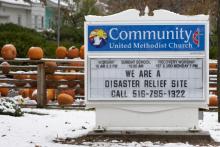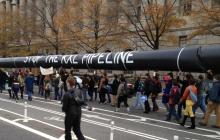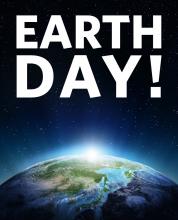Environmental Stewardship

While relaxing on a friend’s back porch over a spicy vegetarian stew and homemade bread, the conversation turned, naturally, to food. Everyone around the table expressed concern over how much junk food kids eat and how little time children spend outdoors. Our host said that she watches every afternoon as a group of elementary schoolchildren head to the corner market to purchase their after-school snack. Each child comes out with a supersized soda and a bag of potato chips. Not a small bag — the family size, for each child, every day.

This week marked six months since Superstorm Sandy left entire communities devastated, families homeless, and many with little hope. But in the midst of this natural disaster, many banded together. As is true with many of our nation's tragedies, recent and throughout our history, communities form and hope emerges amid struggle. Sandy taught us about resilience. It showed us what it truly means to reach out, serve, and love our neighbor.
One young filmmaker in New York, Farihah Zaman, caught that resilience and acts of service on video. Here, she shows us how tragedy can turn into a joint effort to acheive the common good.

Is there anything more important to us than the air we take into our lungs every few seconds? The water that keeps us and all living things going? The soil that roots our food and our communities? Or the weather patterns that knit these elements all together?
What happens when these things begin to deteriorate — or rapidly change their behavior?
That is why I’m in Kenya with Cal DeWitt — well known Christian environmental scientist and teacher — and a group of eight others from the US and Canada: scientists, teachers, activists, and a film-maker.
The expansion of hydrofracking could strain water resources from Forth Worth to western Colorado. The New York Times reports:
“Given projected sharp increases” in the production of oil and gas by the technique commonly known as fracking, the report from the group Ceres said, “and the intense nature of local water demands, competition and conflicts over water should be a growing concern for companies, policy makers and investors.”
One option is to recycle the water used in hyrdofracking. However the water may contain chemicals, natural pollutants, or ever radioactivity and it is expensive to clean the water. Some companies are expanding their use of brackish, undrinkable water unstead of fresh water to lessen their environmental impact.
Read more here.
General Motors signed the Climate Declaration. The statement is part of a new initiative by businesses for greater action on global warming in Washignton. No specific recommendations are made in the declaration. The Guardian reports:
"We want to be a change agent in the auto industry," Mike Robinson, GM vice-president of sustainability and global regulatory affairs, said in a statement.
Other endorsers of the Climate Declaration include eBay, Ceres, Starbucks, and Unilever.
The short statement, endorsed by GM, leads off: "Tacking climate change is America's greatest economic opportunity of the 21st century (and it's simply the right thing to do)."
Read more here.
The ratio of carbon dioxide in Earth’s atmosphere is approaching with 400 parts per million. This amount of carbon dioxide in the atmosphere has not been seen since about 2.5 million to 5 million year ago. Scientists are alarmed that CO2 levels are also rising in places far from pollution sources. The Los Angeles Times reports:
"The 400-ppm threshold is a sobering milestone, and should serve as a wake-up call for all of us to support clean-energy technology and reduce emissions of greenhouse gases, before it's too late for our children and grandchildren," said Tim Lueker, an oceanographer and carbon cycle researcher who is a longtime member of the Scripps CO2 Group.
Read more here.

In the secular American political world, even among progressives, two progressive focuses – social justice and healing of the Earth – have remained mostly segregated from each other.
But the Bible, in one of its crucial passages, intertwine social justice and the urge toward healing Earth. It is as if the Bible – after watching the alienation of two May Days (pagan spring and workers’ social justice) from each other – had shrugged impatiently and said: “Now here’s the way to do it!”
The Bible calls for an entire year of rest for the land and its workers, every seventh year. Deuteronomy adds that in that year, everyone’s debts are annulled. (Deut. 15: 1-3). Thus the Bible sees economics and ecologics as intimately intertwined, and calls for a practice of strong, spiritually rooted regulation of both.
Leviticus calls this seventh year a Shabbat Shabbaton – restfulness to the exponential power of Restfulness, an echo and expansion of the restful seventh day. Deuteronomy calls the year “shmitah” – “release” or “non-attachment.”
Why all this? Because, says YHWH, YyyyHhhhWwwwHhhh, The Interbreathing of all life, “The earth is Mine. You are but sojourners, temporary visiting-settlers, with Me.” (Lev 25: 23)
The sea-surface temperatures were the highest measured in 150 years in 2012. USA Today reports:
"The average temperature in that area hit a record high of 57.2 degrees last year. The previous record was set in 1951, according to NOAA."
The rise in temperature could influence fish and shellfish on the Northeast shell.
Read more here.

A pipeline that will run from Canada, through the Midwest, and down to the Gulf Coast, the purpose of Keystone is to transport tar sands oil, which is more toxic than conventional oil, to ports where it can be processed and shipped overseas. In fact, the only oil that is guaranteed to stay in the U.S. is what will be spilled in communities and on farmlands. We saw this happen recently when a similar pipeline spilled in Arkansas. And, as for the promise of jobs, independent studies say fewer than 50 permanent jobs will be created by this project. Keystone is a deal in which America gets all the risk without any reward.
It's time for our leaders to take a stand and to stop supporting projects that only perpetuate our dependence on toxic, dirty sources of energy that contribute to climate change. But in the world of politics, it's not enough for something to be a moral imperative to get people to act. It is the nature of politics, and democracy, that our leaders respond when they feel the political pressure to do so. As people of faith, we have a powerful voice in our country. Keystone would not have been an issue in the Massachusetts Senate race if local religious communities had not made it clear that it is important.

Stories are what change the world, more than just ideas. And that’s what I am seeing and hearing on the road — stories that will change people for the common good. Nobody outside of Washington trusts Washington because there are no more human stories — just money and the calculations of power.
But even Washington can be affected by the stories outside of Washington — take immigration reform for example, which will happen despite the political paralysis. People of faith are telling their stories of conversion to what their Bibles say about “the stranger.” They are telling stories of new relationships with their “undocumented” brothers and sisters. And their stories are changing Washington.
So rather than just offer you more “ideas” about the common good, we are going to offer you some stories about how ordinary people are creating it.
Some talented young filmmakers have created stories to inspire you. This first video tells in beautiful scenes, the story of how a group in the Dominican Republic is using a recycling program to fund senior services. It’s about community and about serving our neighbors. It is a real inspiration for working within our own spheres of influence for the good of all.
Watch. Listen. And then create your own story for the common good.

Have you ever heard someone described as, “So heavenly minded, he was no earthly good?” This phrase suggests one danger of interpreting the book of Revelation. Sadly, when it comes to considering the natural world and Revelation, heavenly mindedness often undermines care for our environment. Some Christians have a tendency to think, “Well, if I’m off to heaven, I shouldn’t care much about this silly earth of ours. It’s just a temporary home, after all.”
In fact, Revelation suggests the opposite: the earth isn’t truly “left behind,” but renewed, becoming the very dwelling place of God. Revelation 21 calls people to be, well, “earthly good,” caring for creation as we prepare for God to come home.

In the midst of our celebration of Earth Day, government agencies continued the debate over the Keystone XL Pipeline, which would transport oil from Canada’s tar sands across the United States into the gulf coast of Texas to be refined and shipped elsewhere. The State Department, tasked with reviewing the pipeline’s environmental impact, gave it a tentative pass a month and a half ago.
Activists across the country sprang into action to oppose the pipeline, citing its contribution to climate change and risk of oil spills. Supporters of the pipeline shot back, denying the climate impact of the pipeline and claiming that the oil would be produced whether or not the Keystone project moved forward.
The Environmental Protection Agency responded yesterday, calling into question the State Department’s findings and echoing the concerns of environmental activists everywhere: the Keystone Pipeline would be greatly exacerbate climate change.

Today is Earth day! More than 1 billion people in 192 countries are participating in Earth Day festivities, which means there must be some good videos out there on the Internet commemorating this occasion, right? Right. So here are the five of our favorites videos — in no particular order — celebrating the Earth and the day designated for it.
1. Where did Earth Day come from? Get some info about Earth Day.

Unfortunately, Earth Day is rarely celebrated within mainstream Christianity beyond a Sunday sermon, and environmentalism is often frowned upon by evangelical leaders instead of championed. Here are the main reasons Christians have rejected caring for our environment.
Resources to help you join the battle to stop the construction of the Keystone XL pipeline
With its earth roof, straw bale walls, and cordwood construction, Woodhaven is a beauty to behold. Linda and Scot DeGraf’s handmade, ecofriendly home in West Virginia is featured in “Built to Last,” in the May 2013 issue of Sojourners magazine. Read their story of how they not only built a sustainable home, but also built community along the way.
While many people continue to believe there is no climate crisis, those most affected by global warming—particularly in the global South—know otherwise. According to Sojourners magazine’s interview with Malawi activist Victor Mughogho, the “impacts are quite severe on the ground.”
Rose Marie Berger writes in the May 2013 Sojourners magazine cover story, “For God So Loved the World,” that people of faith are key to reversing climate change. It will take a holy power shift to compel God’s people to care for creation and “launch an irresistible force for change.”
In creative and bold ways, people of faith from various religious traditions are doing just that. Together, they are raising their voices and taking action to address climate change.
CRITICS HAVE BEMOANED the lack of fiction centered on climate change, which seems to mirror our public sluggishness about this scientific reality. But two recent novels, Barbara Kingsolver's Flight Behavior (Harper) and Lauren Groff's Arcadia (Voice), artfully integrate climate change into their plotlines, weaving scientific truth about global warming into the lives of fictional characters. Just as compelling, both works of fiction feature spiritual community at the center of critical decisions about the future of the land and its inhabitants.
Flight Behavior is a lyrical story set in rural Tennessee with the fiercely intelligent Dellarobia Turnbow as the main character. She encounters a vast sea of monarch butterflies that seem to have taken a wrong turn on their migratory path, a result of a miracle—or a warming planet. Journalists, ecologists, and locals speculate about the misplaced monarchs. In an impassioned but measured plea for the land, the local pastor invokes a biblical mandate for creation care.
In Arcadia, climate change doesn't enter the narrative until the conclusion of the story, which is the tale of an intentional community started in the 1960s. The central character, Bit Stone, returns to a failed commune in upstate New York, where he grew up, to care for his ailing mother. Set in 2018, the dystopian conclusion is marked by climate change and global pandemics, but the values of the original spiritual community set up a struggle between the desire for freedom and the creation of shared life.
Climate scientists have warned that climate change will bring about—and already is bringing about—more frequent and fiercer storms. But climate change leads to far more than just destructive weather patterns, with consequences in almost all aspects of our lives. Here are just a few of the many possible effects of our rising global temperature.
Natural disasters will increase.
Climate change increases the risk of natural disasters that disproportionately affect low-income people who lack the resources to prepare, recover, or relocate.
Food will be scarcer and more expensive.
Food prices increase as farmers face new levels of unpredictability in weather patterns. Drought and floods may cause widespread soil infertility and increased plant diseases.
We'll experience more drought—and floods.
Changes in weather patterns lead to both increased drought and flooding, because warmer air can hold more water. Many dry places will become drier, while others will be inundated with rain.